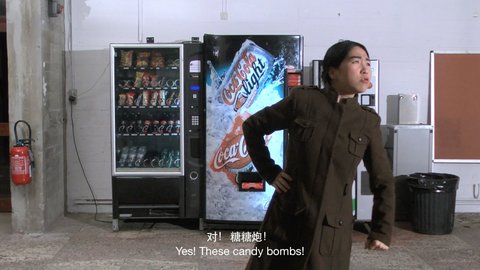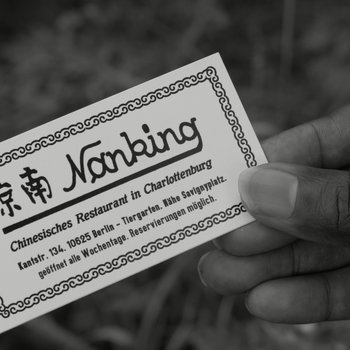YAO Qingmei: The Trial (2013), looped clip
© Courtesy of the artist
Vor zehn Jahren steckte ich einmal in meiner Kunstschule zwei Euro in einen Automaten. Leider funktionierte der Automat manchmal nicht richtig, so dass er zwar mein Geld nahm, aber kein Produkt ausgab. Frustriert trat ich ein paar Mal gegen den Automaten und rief spöttisch: „Du kapitalistische Maschine! Du wirst noch von mir hören.“ Mein französischer Klassenkamerad war von dieser Szene amüsiert, was mich zu der Erkenntnis führte, dass mein Humor universell ist und dass solche Handlungen und Rhetorik allgemein verstanden werden, eine gemeinsame Identität haben. Auch in China amüsiert man sich über Aktionen und rhetorische Mittel, die an die Kulturrevolution erinnern.
In gewisser Hinsicht mag die Abkehr von diesem sozialistischen, militaristischen Ton ähnlich sein, da diese Sprachen mit dem Untergang des großen Narrativs des Kommunismus zerfielen. Für Ostdeutschland sind dieser revolutionäre Ton und die rhetorische Technik womöglich inzwischen zu längst vergangener Geschichte geworden, so dass die Menschen heute aus einer distanzierteren Perspektive daran denken und sie kritisieren. In China, das immer noch im System kommunistischer Diskurse lebt, mit einer von Ideologie und Realität abgekoppelten Rhetorik und innerhalb dieses kontinuierlich autoritären Tons, ist die Loslösung Teil des täglichen Lebens geworden. Es ist wie ein dünner Nebel im täglichen Leben oder wie Partikel, die in der Luft schweben und in den Körper gelangen. Der „vom Kapitalismus korrodierte“ Körper kann ein Gefühl der Abscheu auslösen, dem man sich nur schwer entziehen kann. Wenn es darum geht, den Kapitalismus zu kritisieren, ist es schwierig, eine angemessene Perspektive für den Widerstand gegen das derzeitige System zu finden. Für mich persönlich fühlt es sich eher an wie bei Don Quijote, der gegen Windmühlen kämpft und damit ein Gefühl von Heldentum und Absurdität zugleich auslöst.
Die Dialektik des Marxismus begleitet uns durch die gesamte Schulzeit, von der Grundschule bis zur Universität, wenn auch oft auf doktrinäre Weise. Es ist irgendwie frustrierend und seltsam, dass wir über die Instrumente der Kritik und die Tools des Denkens verfügen, sie aber nicht auf die Realität anwenden können, in der wir leben. Dieser ständige Zustand von Konflikten und Widersprüchen spiegelt die ideologische Unverdaulichkeit unserer Realität wider. Letztlich ist diese Videoarbeit das Ergebnis meiner Überlegungen und Nachforschungen.
Der Kommunismus hat sich in eine schöne Dekoration verwandelt, die mit der Realität, in der wir leben, nicht mehr übereinstimmt und zu einer unvereinbaren, unverträglichen Sprache der Ideologie geworden ist. Sie ist für jemanden, der darin geübt ist, leicht zu erkennen, weil die Worte der Menschen im Alltag lebendig sind und sich von diesen Sprachen grundlegend unterscheiden. Diese ideologische Sprache ist aufgrund ihrer Steifheit, Starrheit und Hohlheit mit einem Gefühl der Überkommenheit verbunden, seit ihr Referenzpunkt entfernt wurde: Es ist, als würde man einem Menschen die Essenz aus dem Körper nehmen. Sie ist zu einer Sprache von Zombies geworden, leer und rein formal. Die Angst vor dieser Aushöhlung ist die Angst vor der Verwandlung in einen erstarrten lebenden Toten, es ist eine Angst vor uns selbst. Dieser Militarismus treibt den Körper dazu, in einem ewigen Zustand der muskulären und geistigen Anspannung zu existieren, immer positiv, stark und energisch.

Qingmei YAO: The Trial (2013), Filmstill
© Courtesy of the artist
Ich wurde Anfang der 1980er Jahre in einer typischen ländlichen Gegend an der Südostküste Chinas geboren, die heute als „neues sozialistisches Land“ bekannt ist. Die Ära der materiellen Knappheit in der Planwirtschaft habe ich nie miterlebt. Ich gehörte stattdessen zu der Generation, die kurz nach der Einführung der Wirtschaftsreformen in China geboren wurde und unter dem Einfluss der „Zuckerguss-Artillerie des Kapitalismus“ aufgewachsen ist. Im Gegensatz zu den Regionen im Norden, die während der Zeit der Planwirtschaft dank der Schwerindustrie florierten, erlebten die südöstlichen Küstengebiete durch die Wirtschaftsreformen in den frühen 1980er Jahren eine rasche Urbanisierung und Entwicklung. Unsere derzeitige Phase wird offiziell als „erste Stufe des Sozialismus“ bezeichnet. Die meisten Menschen sind geschäftlich tätig, betreiben kleine Unternehmen, und es gibt einen ständigen Strom von Geschäftsreisenden und Unternehmern.
In meiner Erinnerung waren die 1990er Jahre durch ständige Bau- und Umbauarbeiten an den Orten, an denen wir lebten, gekennzeichnet. Wo man auch hinschaute, wurde gebaut, die Stadtlandschaften befanden sich in einem raschen Wandel. Ich erinnere mich, dass ich während meiner Mittelschulzeit ein halbes Jahr in einem Internat verbracht habe. Es war nur 20 Kilometer von meiner kleinen Heimatstadt entfernt, und während dieser Zeit wurden sowohl die Straßen als auch die daran liegenden Häuser erneuert. Die Umgebung der Straße von meinem Heimatbahnhof aus hatte sich in diesen sechs Monaten so drastisch verändert, dass ich meine Haltestelle verpasste und dies erst nach einiger Zeit bemerkte. Die Menschen schienen die Zukunft mit einem unerschütterlichen, scheinbar ideologiegetriebenen Enthusiasmus zu begrüßen und nahmen inmitten des Chaos und der Euphorie schnell neue Dinge und Informationen auf. Dieser rasche Wandel hat uns jedoch auch die Orientierung in Bezug auf Geschichte, Geografie und unser Wertesystem genommen. Es kommt mir vor, als gäbe es mehrere kurze, fast magische Phasen in meiner Erinnerung.
Als ich klein war, gab es im Haus meiner Großmutter noch Gaslampen und es wurde mit einem Holzofen gekocht. Es gab weder ein eigenes Bad noch heißes Wasser. Doch der Fortschritt war so rasant, dass meine Familie innerhalb von etwas mehr als einem Jahrzehnt, als ich auf die Hochschule kam, einen Computer erwarb und in die Welt des Internets und ICQ eintauchte. Abgesehen von dem unerbittlichen Lauf der Zeit, der aufgrund der rasanten Entwicklung zu einem Gefühl der Unordnung geführt hat, scheint es, dass nur die marxistisch-leninistischen Lehren in unseren Lehrbüchern unverändert geblieben sind. Inmitten dieses reichen und chaotischen Lebens erscheinen diese ideologischen Ausdrucksformen immer weiter entfernt, unfähig, mit der komplexen Welt, in der wir leben, zu harmonisieren.
Persönlich habe ich den Einfluss der DDR in meinem Leben nie gespürt. Ein Grund dafür ist die geografische Abgeschiedenheit, in der ich aufgewachsen bin. Während meiner Kindheit war die Sowjetunion im Leben des chinesischen Volkes stärker präsent. Russische Lieder, Filme, Theaterstücke und Literatur wurden in der chinesischen Kultur sehr bewundert und waren sogar Teil des Lehrplans unserer Schulen.
Ursprünglich hatte ich die Absicht, ein Performance-Stück zu machen. Ich überlegte, einen hölzernen Wagen für den Automaten zu bauen und damit durch die Straßen zu ziehen, ähnlich wie mit einem Gefangenenwagen, als eine Form der Kritik. Dieses Konzept war von der Kulturrevolution inspiriert, als die Menschen vorgeführt und öffentlich kritisiert wurden, um sie zu demütigen. Mir fehlten jedoch die Mittel, um den Automaten umzubauen, oder die körperliche Kraft, um ihn zu bewegen, also beschloss ich, ihn an seinem ursprünglichen Standort zur Rede zu stellen und zu kritisieren.
Nachdem ich den Text fertig hatte, lernte ich ihn über einen Monat lang gründlich auswendig und übte meine körperlichen Bewegungen nach revolutionären Opernvorbildern aus den 1960er Jahren ein. Die Audiokomponenten des Automaten wurden vorab aufgezeichnet, und vor Ort spielte jemand die Dialoge des Automaten synchron zum Text ab. Auf diese Weise entstand ein natürlicher Rhythmus, der den Eindruck erweckte, als ob der Automat wirklich mit mir in einen Dialog treten würde. Zunächst habe ich die Performance aufgezeichnet, um mich zu beobachten und meine Bewegungen und Haltungen aus der Perspektive des Publikums anzupassen. Schließlich wurde mir klar, dass die Arbeit auch effektiv als Video existieren könnte.
Am offiziellen Aufnahmetag haben wir die Aufführung, glaube ich, mehr als zehn Mal wiederholt. Während meiner Proben und Aufnahmen konnten die Leute dann auch wirklich keine Süßigkeiten aus dem Automaten kaufen. Der Leuchteffekt am Automaten wurde in der Nachbearbeitung hinzugefügt, da ich nicht die Befugnis hatte, ihn physisch zu verändern. Diese Beleuchtung verlieh dem Automaten eine Low-Tech-Ästhetik, die an Low-Budget Science-Fiction erinnert und zu den spielerischen und skurrilen Aspekten meiner Arbeit passt.
In meinen aktuellen Projekten arbeite ich immer mehr mit Tänzern und Schauspielern zusammen, die über körperliche Fähigkeiten in verschiedenen Bereichen verfügen. Ich erforsche ein Gefühl von Spontaneität und Entspannung in ihren starken, energiegeladenen Körpern, das über den Rahmen choreografischer Disziplin hinausgeht. Derzeit bearbeite ich ein neues visuelles Werk mit dem Titel ‚Prelude to Love‘. Ich habe eine pensionierte Sopranistin aus der ehemaligen Gesangs- und Tanztruppe der Volksbefreiungsarmee eingeladen, ein bekanntes chinesisches patriotisches Lied zu interpretieren. Der Schwerpunkt liegt jedoch nicht auf ihrem Gesang, sondern auf ihren emotionalen Ausrichtungen und körperlichen Bewegungen während des Vorspiels. Das Vorspiel zum Werk beginnt und die Opernsängerin fängt an, sich emotional vorzubereiten. Kurz bevor sie den ersten Ton singt, unterbreche ich sie und bitte sie, noch einmal anzufangen. Durch diesen ständigen Zyklus von Starten und Stoppen kann das Publikum gelegentlich den Anfang der ersten Note hören, erfährt aber nie, was sie eigentlich singen wird. Die Essenz dieses Videos liegt in der Erforschung der Anspannung vor der eigentlichen Aufführung und der plötzlichen Entspannung. Es wird gezeigt, wie ein symbolisch trainierter Körper, der sich einer Ideologie verschrieben hat, in einen spontaneren und entspannteren, dem Individuum eigenen Zustand zurückkehrt, wobei sich durch die Wiederholungen gewisse Unterschiede manifestieren.
[Die Fragen stellte Jacob Franke.]

Auch interessant:
Der Film „The Guestbook“ von Musquiqui Chihying und Gregor Kasper ist noch bis Anfang November in unserer Reihe zu China im Rahmen des „Kontrapunkte“-Projekts hier auf Voices zu sehen. Die Kuratorin der Reihe, Mia Yu, hat für uns mit den beiden Regisseuren gesprochen.

Iwan Kawaleridse hat eine bedeutende Rolle in der ukrainischen Kultur gespielt. In der heutigen Ukraine ist sein Name allerdings kaum bekannt und im Ausland haben überhaupt nur sehr wenige Menschen von ihm gehört. Aktuell sind bei uns auf voices Auszüge seines Films "Prometheus" und im Albertinum das Modell einer seiner Skulpturen in der Ausstellung "Kaleidskop der Geschichte(n)" zu sehen. Stanislav Menzelevskyi über Kawaleridse als Filmemacher und das Verbot von "Prometheus".

Wer in Mai oder Juni im Garten des Japanischen Palais unter der von Hopfen berankten Pergola saß, hat sich vermutlich über die klebrigen Blätter gewundert und wer genauer hinschaute, konnte sicher auch die vielen millimeterkleinen, schwarzen Tierchen an den Pflanzstängeln oder Blattunterseiten entdecken - die Blattläuse.
